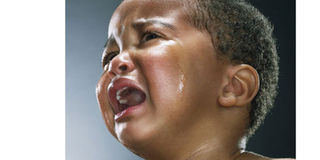Symptoms you should not ignore in your child

Persistent crying is one of the deadly symptoms. Net photo
As a parent, guardian, or a babysitter, it is a responsibility to protect the youngsters every day, and knowing the symptoms to watch out for could help keep a child healthy, or even save their life.
Dr Sabrina Kitaka, a consultant paediatrician at Mulago Hospital, says there are certain symptoms, particularly in children, which should never be ignored, as they could be indicating a number of ‘red flag’ diagnoses that need to be addressed sooner than later by a health professional.
Fever
Temperature in children often fluctuate unlike among adults. A slight rise in temperature may indicate a fever. It is advisable to give the child a warm bathe and let them sleep early enough if there are no other symptoms, they will be okay after sleep.
Dr Kitaka says, “If the child however, is acting strange and their temperature is above 37°C, you should not ignore this. Take note of any other symptoms such as a skin rash, stiff neck, sleepiness or drowsiness, floppy limbs, high-pitched crying, diarrhoea or vomiting.”
Breathing problems
Breathing issues of any kind should be treated seriously for infants under six months and older children.
Normal breathing, says Dr Deo Munube, a consultant paeditrician at Mulago Hospital, is supposed to be exclusively through the nose and not the mouth. If the nose becomes blocked in any way, the baby cannot breathe efficiently and will be forced to open their mouth to breathe.
“If a child has a cold with a stuffy nose, you can unblock it using a few drops of saline water for older children. Seek medical attention immediately if you do not notice any change after a few hours,” he says.
Also if the child develops a pale skin, chest pain, makes a wheezing sound while breathing, severe coughing, coughing blood, have an object lodged in the throat, seek medical attention.
Headaches
Children do not get headaches very often but sometimes they get migraines just like adults. A little rest and plenty of fluids may ward off a headache. Watch out for the cause of the headache and see a doctor if it is after recent trauma, or if the child has a stiff neck, weakness in the limbs, associated with vomiting, blurred vision or dizziness.
Allergies
Children develop more allergies than adults. If there is family history of allergies, a child is then more likely to develop allergies too. It could be because some type of food such as dairy on their diet or animal furs.
Asthma is also common in children and can be triggered by perfume, smoke, dust and other strong odours. Once you know the allergens and triggers, you can keep your child out of danger.
Dr Kitaka advises that you see a doctor if the child develops swelling around the eyes and mouth, swelling of the lips and tongue, sudden difficulty breathing, fainting or seizures. They may be signs of poisoning too.
Skin rash
It is normal for babies to develop skin rashes from as early as a few days old. It is because their sensitive skin is adapting to a new environment. It could be diaper or heat rash and these are usually no cause to worry because they are harmless and the child continues to play and often clear on their own.
“If your baby develops any of these, ensure that you wash your hands before and after every diaper change, check your baby’s diaper often, and change it as soon as it becomes wet or soiled, gently pat the area clean and dry, rather than rubbing,” Dr Munube says.
An itchy, blister-like skin rash accompanied by a fever, runny nose that makes your child seem unwell must be reported to the doctor as soon as possible.
Ear problems
He remarks that ear problems range from the ability to respond to sound, buzzing sounds to discharges. Any parent should be able to notice their child’s response to sound as early as three months.
“If your child gets undisturbed sleep even when there is a lot of noise,” says Dr Munube, they may have hearing problems and you need to see an audiologist very soon. Once the problem is detected early, your child may be saved from being deaf. Also take note if a child complains about buzzing sound in the ear or has a pus and bloody discharge.”
Hyperactivity
If your child is showing hyperactivity, it could be a sign of emotional, behavioral or mental health problem that needs immediate professional attention.
Dr Kitaka warns that hyperactivity or constant movement beyond regular playing, frequent, unexplainable temper tantrums, unusual fears or worries, difficulty taking part in activities that are normal for your child’s age, lack of concentration or attention, withdrawal from friends could be signs of development disabilities.
More symptoms may include sudden outbursts or explosive emotional reactions, refusal to go to school on a regular basis, extreme perfectionism, mood swings with no apparent cause, easily bored or angered, isolation, loneliness, and a lack of friends, running away, and violence.
She says, “Presence of the above symptoms accompanied by delayed speech and or walking, see a neurologist immediately. If your child talks of suicide or hurts himself or others intentionally, get immediate assistance and do not leave your child alone. Your child may need psychiatric assessment.”
Key
Dr Sabrina Kitaka, a consultant paediatrician at Mulago Hospital, says even when the issue seems small, it does not harm for you to consult a doctor. “You may not be able to rule out what symptoms would be fatal to your child. It is better to get reassurance from the doctor than trusting your instincts.”




